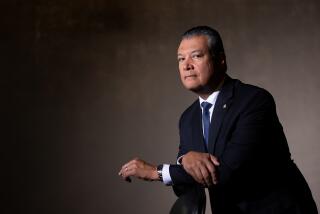FBI Says It Didn’t Set Out to Arrest Al Qaeda Suspect Padilla
- Share via
MIAMI — The FBI agent who first questioned Jose Padilla when the suspected Al Qaeda operative arrived in Chicago in 2002 said Monday that authorities hoped to win Padilla’s trust, not arrest him.
Special Agent Russell Fincher testified at a federal court hearing that the agency thought Padilla knew of plans to detonate a radioactive device on U.S. soil and wanted his help to disrupt the plot.
“I didn’t want to arrest him,” Fincher said. “I needed his cooperation.”
U.S. Magistrate Judge Stephen Brown is to determine whether Padilla’s statements to federal agents during his interrogation at O’Hare International Airport should be kept out of his criminal trial because he was not first advised of his constitutional rights.
After 3 1/2 years of detention as an “enemy combatant,” Padilla, 35, was charged in November with being part of a North American-based terrorist cell and of training at an Al Qaeda camp in Afghanistan.
Fincher testified he arrested Padilla after the suspect ended the interview and demanded a lawyer.
Fincher said at that point he advised Padilla of his right to remain silent and consult with an attorney.
Padilla’s defense lawyer, Michael Caruso, said Fincher had an arrest warrant in hand when the questioning began. “There was no way Mr. Padilla was going to walk out of that conference room of his own accord, isn’t that correct?” Caruso asked.
Fincher said Padilla “could have cooperated with us. Us having to arrest him was the worst-case scenario.”
Padilla flew to Chicago from Zurich on May 8, 2002, as he made his way back to the United States after several years in the Middle East.
A customs agent took Padilla to an executive conference room where he was questioned by four FBI agents for about five hours.
Fincher said the agents used an alleged customs violation as a pretext for their questions.
Padilla spoke freely about growing up in Chicago, getting involved in gangs as a youth and converting to Islam while in prison in Florida, Fincher said. However, when asked about his travels and contacts in the Middle East, Padilla became vague and evasive, the agent said.
Fincher said he stated his belief that Padilla was in the U.S. to execute a terrorist attack. At that point, Fincher said, Padilla stood up and said he wished to end the interview.
More to Read
Sign up for Essential California
The most important California stories and recommendations in your inbox every morning.
You may occasionally receive promotional content from the Los Angeles Times.








